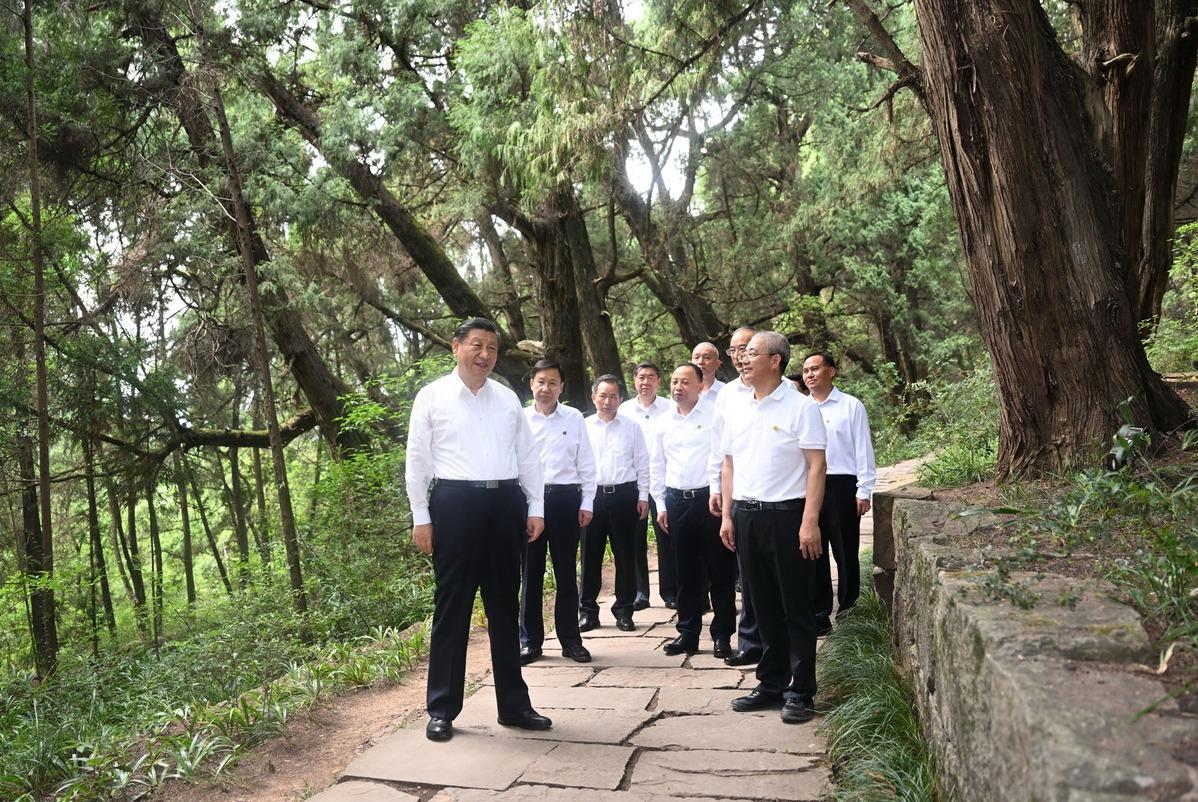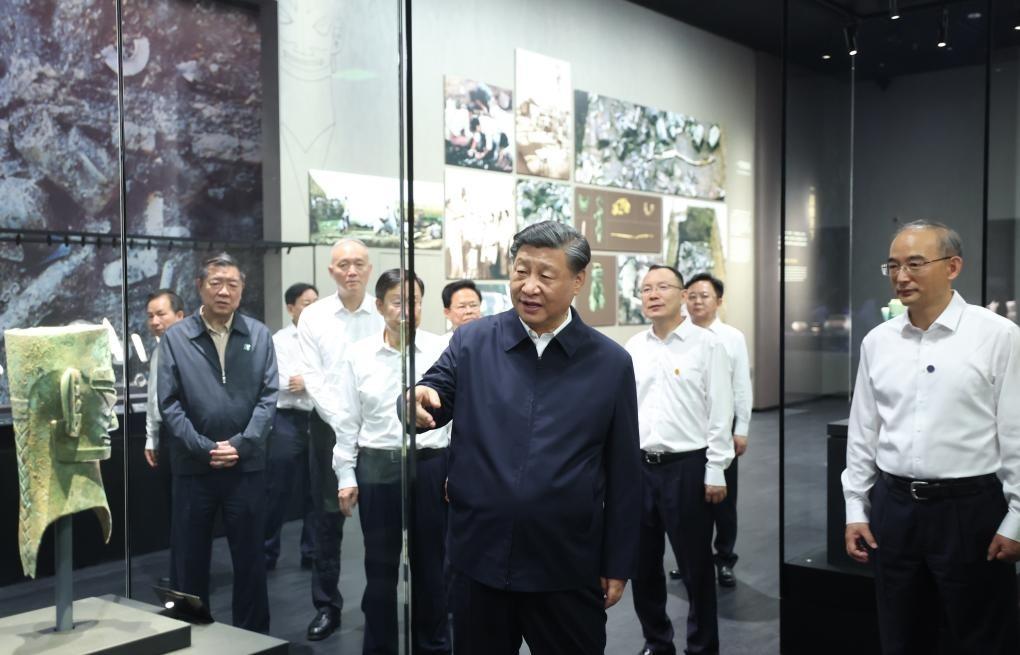 General Secretary of the Communist Party of China Central Committee Xi Jinping (left), also Chinese president and chairman of the Central Military Commission, visits the site of a section of an ancient road system known as "Shudao" in Guangyuan city, southwest China's Sichuan province, July 25, 2023. (PHOTO / XINHUA)
General Secretary of the Communist Party of China Central Committee Xi Jinping (left), also Chinese president and chairman of the Central Military Commission, visits the site of a section of an ancient road system known as "Shudao" in Guangyuan city, southwest China's Sichuan province, July 25, 2023. (PHOTO / XINHUA)
Promoting cultural development to build a modern Chinese civilization and enhancing environmental conservation to build an ecological civilization were highlighted by President Xi Jinping during his recent inspection tour in Sichuan and Shaanxi provinces.
During his stay in Sichuan last week, Xi, who is also general secretary of the Communist Party of China Central Committee and chairman of the Central Military Commission, visited the cities of Guangyuan and Deyang from Tuesday to Thursday and heard reports from local Party and government officials about their work.
As part of his important agenda in Sichuan, Xi attended the opening ceremony on Friday of the 31st FISU World University Games in Chengdu, the provincial capital. On his way back to Beijing on Saturday, Xi visited the city of Hanzhong in Shaanxi province.
Xi emphasized that cultural relic protection and restoration is a long-term task, and he called for increasing national support, stepping up training of personnel and carrying forward rigorous and meticulous craftsmanship
Xi has said on many occasions that culture plays a unique and irreplaceable role in the governance of the country and the building of a modern Chinese civilization. During his recent inspection tour, he reiterated the importance of cultural inheritance and development.
On Wednesday, Xi visited the new building of the Sanxingdui Museum in Deyang. The museum, which recently began trial operations, boasts nearly 600 relics unearthed from the renowned Sanxingdui Ruins, which are believed to be remnants of the ancient Shu Kingdom dating back more than 4,000 years.
ALSO READ:The fabric of Chinese culture
A total of more than 1,500 pieces or sets of relics, including pottery, bronze, jade and gold wares, are showcased in the new building, which has an exhibition area of 22,000 square meters.
After touring the exhibition halls, Xi went to the area of the museum where relics preservation and repair work is done, and he carefully observed procedures and the latest techniques and talked with staff members.
Xi emphasized that cultural relic protection and restoration is a long-term task, and he called for increasing national support, stepping up training of personnel and carrying forward rigorous and meticulous craftsmanship.
On his way back to Beijing, while visiting the Hanzhong Museum in Shaanxi, Xi said that cultural relics are bearers of splendid civilization, reflect the inheritance of history and culture, and maintain national spirit.
He emphasized making good use of museums and called for efforts to expand the influence of Chinese culture. Xi urged the museum to play its role of inheriting, researching and displaying human civilization as well as expanding the influence of Chinese culture.
Thanks to the great attention paid by the CPC Central Committee with Xi at the core, China has made notable progress in the protection of cultural relics over the past decade. By the end of 2021, there were 108 million State-owned movable cultural relics and about 767,000 immovable ones. The number of world heritage sites in China has reached 56, ranking second in the world, according to the Ministry of Culture and Tourism.
ALSO READ:Traditional culture propels Chinese modernization
 General Secretary of the Communist Party of China Central Committee Xi Jinping (foreground), also Chinese president and chairman of the Central Military Commission, visits the Sanxingdui Museum in Deyang city, southwest China's Sichuan province, July 26, 2023. (PHOTO / XINHUA)
General Secretary of the Communist Party of China Central Committee Xi Jinping (foreground), also Chinese president and chairman of the Central Military Commission, visits the Sanxingdui Museum in Deyang city, southwest China's Sichuan province, July 26, 2023. (PHOTO / XINHUA)
With ecological conservation always in mind, Xi has been advocating the building of an ecological civilization while promoting all-around social and economic growth. The first stop on his inspection tour in Sichuan last week was the site of a section of Shudao, an ancient road system in the city of Guangyuan.
The Cuiyunlang section of Shudao, which Xi visited, serves as a fine example of the road's development and evolution. It has around 7,800 ancient cypress trees, which boast an average age of 1,050 years, with the oldest tree dating back approximately 2,300 years. The trees have become the most extensive and populous group of ancient trees lining a man-made pathway, with the longest recorded existence.
Xi stressed the importance of building and implementing institutional frameworks, as well as inspiring the people's initiative and creativity in consolidating and expanding the achievements in ecological conservation.
He also inspected Tianhan Wetland Park in Hanzhong on Saturday, calling it a park of happiness for local people.
The construction of ecological parks should conform with nature, Xi said. He urged efforts to strengthen the overall protection and systematic restoration of wetland ecosystems, promote the mutual integration of ecological protection, economic development and people's lives, and endeavor to build an eco-city there.
ALSO READ: Beijing: China a doer on ecology conservation, climate governance
China boasts 56.35 million hectares of wetlands, including marshes, beaches and lakes, according to the latest official land resource surveys. The country also has 64 wetlands of international importance and 29 wetlands of national importance, as well as 901 national wetland parks. Since 2003, the central government has spent 19.8 billion yuan ($2.8 billion) on over 4,100 projects to advance wetland protection and restoration across the country.
During his inspection in Sichuan, Xi also urged the province to make more progress in science-technology innovation, as well as in building a modern industrial system, promoting rural vitalization and consolidating ecological shields along the upper reaches of the Yangtze and Yellow rivers.
Opening up new areas of development with sci-tech innovation is an urgent requirement for high-quality development, Xi told officials. He called on Sichuan to give full play to its strengths and make efforts on both sci-tech innovation and the application of scientific and technological achievements.
He urged Sichuan to prioritize rural vitalization and further take on the responsibilities of stabilizing grain production and ensuring the supply of major agricultural products such as grain, pork and oilseed crops.


